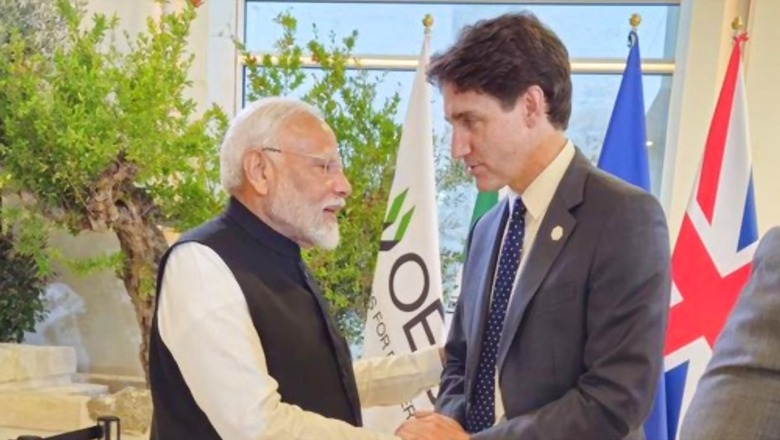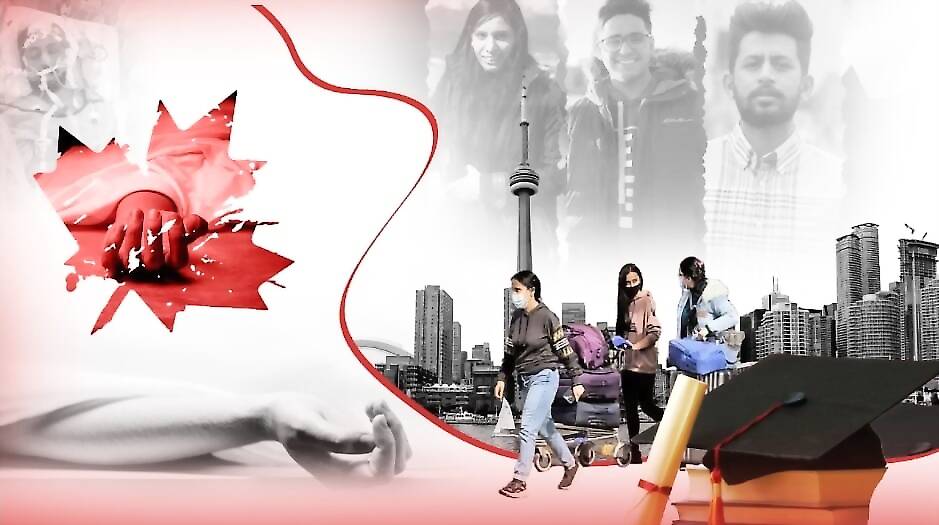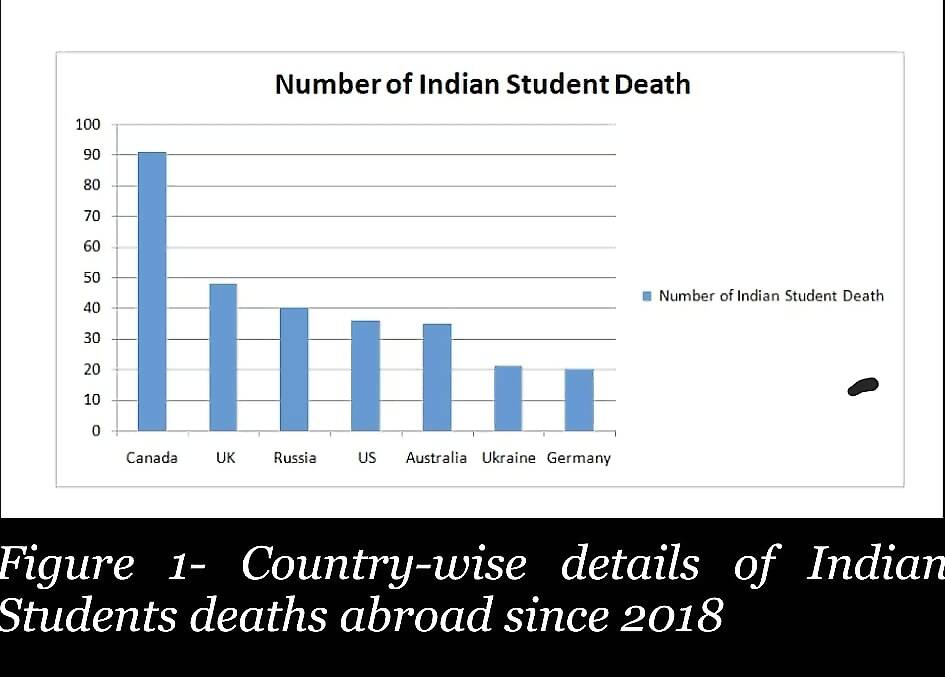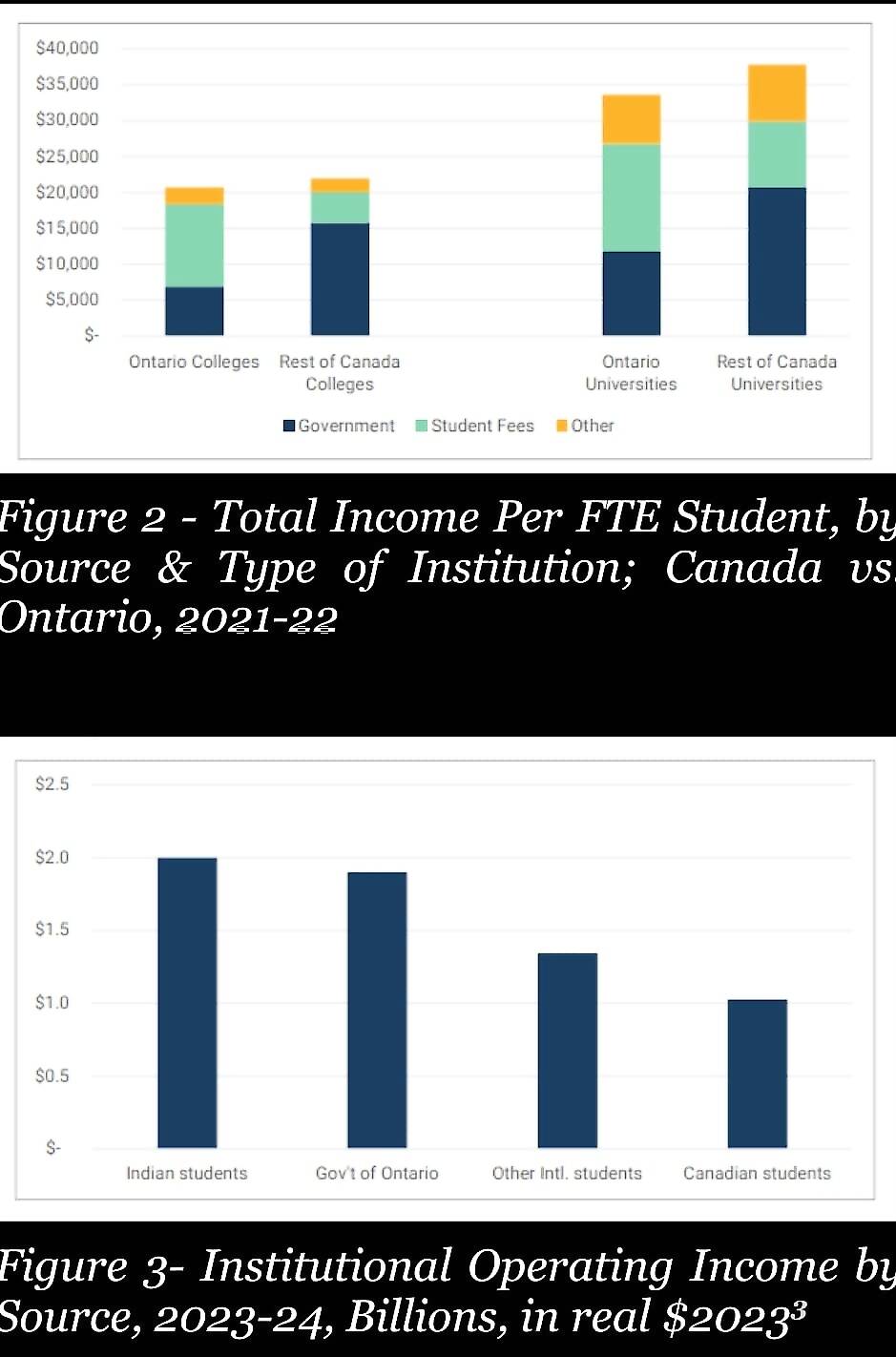
views
Canada, with its multicultural ethos, quality education, post-education employment opportunities and inviting immigration policies, was a huge hit with international students, especially the Indians.
But, not anymore given the resurgence of Khalistani extremism, intertwined with anti-India and anti-Hindu rhetoric that raised concerns for the Indian diaspora. The situation deteriorated further owing to perceived leniency and, at times, tacit encouragement from the Justin Trudeau-led Canadian government.

Reports of hate crimes, targeted attacks on people and Hindu places of worship, vandalism, violence against Indians and racial prejudice have raised concerns and forced Indian students to reconsider their plans to study in Canada.
As per the Indian Ministry of External Affairs, 633 Indian students have died abroad in the past five years due to various causes including violent attacks and accidents. Canada with 172 deaths topped the list. This large death toll was primarily due to attacks.

These developments have raised concerns about a potential crisis in Canadian colleges and universities as international students, especially Indians, who once flocked to the country in large numbers, now seem to be staying away.
Besides safety concerns, there are issues like steep increases in tuition fees and living expenses that forced many prospective students to rethink their decision to study in Canada.
Indian students who go to Canada for post-secondary education contribute around CAD 20 billion annually to that country’s economy, according to data from Immigration, Refugees and Citizenship Canada. This estimate is based on the total number of students studying in Canada, their average college fees and living expenditure.

As shown in the above graph, the majority of international students in Canada are from India. Not only do they contribute nearly twice as much to the college system financially compared to domestic Canadian students, but their overall contributions also exceed those of the Ontario government.
Cultural Diversity
The influx of students from various countries enriches the cultural fabric of Canadian campuses and society. This diversity promotes cross-cultural understanding and prepares students for a globalised workforce.
But, anti-India and anti-Hindu activities propagated by Khalistani extremists through social media campaigns and public demonstrations have created a sense of insecurity among Indian students, reflecting growing tension within the multicultural fabric of Canadian society.
Indian students form one of the largest chunks of the international student population in Canada. They contribute significantly to the country’s cultural diversity. Their acceptance and integration into Canadian society have not only enriched the multicultural landscape but had a profound impact on various aspects of Canadian life including education, community cohesion and cultural exchanges.
Acceptance of cultural diversity by Indian students in Canada has significantly shaped the country’s societal discourse. Through their active participation in cultural, academic, and social spheres, they have contributed to a more vibrant, inclusive, and dynamic Canadian society. The impact of their presence underscores the importance of cultural diversity in fostering mutual understanding, innovation and social cohesion.
Celebration of Indian Festivals
Indian students have introduced and popularised their festivals such as Diwali, Holi and Navratras across Canadian campuses and communities. These celebrations, often organised by Indian student associations, have seen participation from students of diverse backgrounds, fostering cross-cultural understanding and inclusivity. For instance, Diwali events at universities like the University of Toronto and McGill have become major multicultural gatherings, promoting unity and shared experiences among students from different cultures.
Contribution to Academics and Services
Indian students have contributed to the academic and professional landscape in Canada particularly in STEM fields. Their involvement in research, innovation and entrepreneurship has led to collaborations between Canadian and Indian institutions, promoting cultural exchange and knowledge transfer. The success stories of Indian-origin entrepreneurs and professionals in Canada in areas like the tech industry in Toronto or the healthcare sector in Vancouver reflect the positive impact of cultural diversity on economic growth and innovation.
Advocacy and Social Impact
Indian students have played an active role in advocacy for multiculturalism and anti-racism initiatives. In response to incidents of racial discrimination, Indian student groups have collaborated with local organisations to promote awareness and foster a more inclusive society.
Skilled Workforce
Indian students often pursue studies in fields like technology, engineering, healthcare and business that are in high demand in Canada. While studying in Canada, Indian students pay tuition fees, accommodation costs, and other living expenses, contributing significantly to the local economy. Upon graduation, many students from diverse cultural and educational backgrounds enrich the Canadian workforce with unique perspectives and approaches. By gaining specialised knowledge and skills, they not only help to address labour shortages and support sectors critical to the Canadian economy but also contribute through income taxes and other forms of financial support. This diversity fosters innovation and helps Canadian businesses better understand and cater to global markets.
Reasons for Decline
Safety has become a growing concern for international students, particularly Indians in Canada. Reports of inadequate safety measures on campus & off-campus including insufficient security personnel and emergency response protocols exacerbate concerns.
Incidents of violence and crime, particularly in areas with high concentrations of international students, have raised alarm. The Indian Ministry of External Affairs reported about 19 Indian students who were killed overseas during the last five years (2019 to 2024) in attacks with Canada seeing the highest number at nine followed by six in the US. In addition, reports of theft, assault, racial discrimination, hate crimes and vandalism targeting Hindu temples and businesses have increased (due to Khalistani and Islamist threats), reflecting the growing tension within the multicultural fabric of Canadian society.
There is a discernible rise in racial discrimination and xenophobic sentiments in Canada creating an unwelcoming environment for international students, particularly those from India, who face verbal and physical harassment.
Besides safety & targeted attacks, another negating factor for Indian students is the rise in the cost of tuition. Unlike domestic students, who benefit from subsidised education, international students often face exorbitant fees. According to Statistics Canada, the average tuition fee for international undergraduate students in the 2023/2024 academic year was around CAD 33,623 per year, a stark contrast to the approximately CAD 6,000 for domestic students. Graduate programmes also see a stark difference with international students often paying double or triple the amount paid by their Canadian counterparts.
The high cost of living in major Canadian cities such as Toronto, Vancouver and Montreal adds another layer of financial strain for international students. Expenses for housing, food, transportation, other daily expenses and health insurance adding to the overall cost, are significantly higher than in other countries, impacting students’ overall quality of life.
Canada’s two-year cap on international student permits, announced as a response to housing shortages and labour market strains, is a politically motivated move that will have detrimental long-term effects on the country. Indian students, who make up nearly 40% of the international student population, are integral to Canada’s economy. In 2022, international students contributed over CAD 22 billion, with universities like the University of Toronto relying heavily on this revenue—almost 30% of its student body comprises international students. The cap, expected to result in a 35% reduction in study permits in 2024, will hurt not only universities financially but also local economies that benefit from student spending on housing, food, and services.
Moreover, this move contradicts Canada’s long-standing strategy of using international students as a talent pipeline. In 2021, over 96,000 former international students became permanent residents, filling key gaps in sectors like healthcare and IT. With the cap, Canada risks losing out on this critical pool of skilled labour to competing nations like Australia and the UK, which have more open immigration pathways.
Politically, while the cap might momentarily appease domestic concerns, it risks stifling Canada’s economic growth and undermining its reputation as a global education hub.
Under Prime Minister Justin Trudeau, the Canadian government’s handling of Khalistani extremism has emboldened fanatic elements in the country. This leniency is often attributed to the political landscape in Canada where the Sikh community holds considerable influence, especially in key electoral districts. Trudeau’s participation in events organised by Khalistani sympathisers and his refusal to unequivocally condemn their activities has fueled accusations of pandering for political gains.
Growing gun violence in Canada’s main cities particularly Toronto, Edmonton, Calgary, Vancouver, and Montreal is a cause of concern. A study by the Drugs, Alcohol and Violence International (DAVI) in Toronto and Montreal demonstrates significant connections between drugs, weapons and gangs. Based on interviews with 904 male students (grades 9–12), school dropouts and juvenile offenders, the following are the findings:
• There is a link between the availability of firearms and drugs in schools and the prevalence of gangs;
• 18.7 per cent of males in Montreal between ages 14 – 17 and 15.1 per cent in Toronto have taken guns to school;
• School dropouts who engage in drug sales are more likely to be involved in gun-related violence.
The percentage of indigenous victims continues to be disproportionately high, six times higher than that of non-Indigenous victims nationwide. According to Statistics Canada, it has to do with the continued effects of Indigenous people’s colonisation.
Banned terrorist organisation, Sikhs For Justice (SFJ) supports some of the gang members obfuscating the distinction between organised crime and separatist groups. Just days after Trudeau’s announcement, another gangster and pro-Khalistan supporter Sukha Duneke was killed in Winnipeg, Canada. Canada has earned an ignominious reputation as a safe haven for ‘terrorists, for extremists and for organised crime.’ In 1982, the extradition request of Talwinder Singh Parmar, founder of the BKI and mastermind behind the Air India bombing was reportedly refused by the father of Justin Trudeau, Pierre Trudeau.
This leads to the question of whether the Canadian government failed to take these signs more seriously and if they could have done more to provide security to prevent harassment, intimidation and possibly the murder of Canadian citizens with migrant backgrounds. A targeted killing is a clear violation of the right to life. The statements of Trudeau and opposition leaders have not helped shape the discourse against terrorism.
Crisis in Canadian colleges, characterised by safety issues, Khalistani extremism and other significant challenges has compelled Indian students to reconsider their options. Addressing these issues requires a concerted effort from educational institutions, government bodies and community organisations to create a more inclusive, supportive, and affordable environment. Only through such efforts can Canada reclaim its position as a top destination for global education.
Canada is turning into a hub for terrorism & extremism. Canadian governments’ open support to extremist elements under the garb of freedom of speech tarnished the perception that Canada is a secure place to live in and prosper. Canada’s reputation as a safe and friendly destination is in jeopardy due to a surge in hate crimes and violent attacks on Indians. By addressing underlying causes of racism and intolerance and adopting proactive steps to combat hate crimes, Canada can show its dedication to diversity and ensure a safe and respected environment for all its citizens including Indian students.
The situation calls for a balanced approach from the Canadian government that respects freedom of expression and association while addressing the concerns of extremism and hate speech. It is imperative for the Trudeau administration to engage with all stakeholders including the Indian government to find a solution that ensures the safety and security of all communities and uphold principles of mutual respect and cooperation in international relations.
The author is operations head at Centre for Integrated and Holistic Studies, a New Delhi-based non-partisan think tank. Views expressed in the above piece are personal and solely those of the author. They do not necessarily reflect News18’s views.




















Comments
0 comment